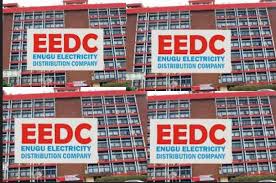The Enugu Electricity Distribution Company (EEDC) is facing heavy criticism from state governments after it drastically cut power supply to MainPower Electricity Distribution Limited (MEDL), leaving parts of Enugu State in darkness for four days. This blackout followed a recent tariff cut enforced by the Enugu Electricity Regulatory Commission (EERC), which reduced electricity tariffs for Band A customers from ₦209.50 per kilowatt-hour to ₦160.40/kWh.
State officials and energy regulators are accusing EEDC of using the blackout to blackmail and arm-twist the state’s regulatory body for slashing the tariffs. In response, the Forum of Commissioners of Power and Energy in Nigeria (FOCPEN) said the time has come for states to begin issuing licences to new electricity distribution companies and break the monopoly of existing Discos like EEDC.
The Secretary of FOCPEN, Omale Omale, who also serves as Benue State’s Commissioner for Power, Renewable Energy and Transport, said EEDC and MEDL are using the blackout to pressure Enugu State’s regulator. He maintained that the power sector had been liberalised and decentralised under the new Electricity Act and states had the right to regulate power and determine tariffs in their territory.
He said Enugu’s action should serve as a pilot for other states. “I can say that this could just be cheap blackmail to arm-twist the regulatory authority in Enugu State. Of course, the market is liberalised. Enugu should know what to do. This will also open the market for other distributors who can offer cost-reflective tariffs,” Omale said.
MainPower, in its own statement, explained that it had informed customers that the blackout was caused by a sharp drop in electricity supplied by EEDC. The company, which distributes electricity to many communities across Enugu State, said it is now operating at only 50 per cent of its regular energy allocation. According to MEDL, this power cut is linked to the new Tariff Order issued by the EERC, which forced them to reduce their Band A tariffs.
The company said the new tariff would cause EEDC to lose over ₦1 billion monthly, making it hard to meet its financial obligations. As a result, EEDC reportedly decided to supply less power to MEDL to cut its losses. MEDL clarified that it does not buy power directly from the national grid but relies on EEDC, which holds a vesting contract with the Nigerian Bulk Electricity Trading company (NBET).
The blackout drew further reaction when Omale revealed that the states had earlier met with the Minister of Power, Chief Adebayo Adelabu, over the tariff issue. Adelabu had planned a meeting with stakeholders in Enugu before the blackout occurred, but the sudden power cut happened before any resolution could be reached.
Omale said the blackout will not stop states from regulating power or designing cost-reflective tariffs. He added that there is a need for deeper engagement among stakeholders such as the Nigerian Electricity Regulatory Commission (NERC), Gencos, transmission companies, and distribution firms to agree on fair tariffs that protect investments while ensuring affordability.
He called on MainPower to open its financial records if it claims the new tariffs are not sustainable. “To arrive at cost-reflective tariffs, your books must be open. What is the cost of generation? What is the transmission cost? What is the distribution cost? And what is the profit margin? Once these are clear, we can all agree,” he explained.
Omale also compared the electricity market to other liberalised sectors like education and petroleum, noting that different universities and petrol stations already operate with different price points. He stressed that decentralisation has come to stay and state regulators should license new Discos who are ready to follow the state’s rules.
Reacting to the crisis, the Chief Executive Officer of the Association of Nigerian Electricity Distributors (ANED), Mr. Sunday Oduntan, said the existing Discos are not afraid of competition and welcome new entrants into the power sector. However, he warned that no business can survive by selling below cost and discouraged states from enforcing unrealistic tariff cuts.
He said, “Anybody entering the sector must be ready to recover their costs. Political pricing will not work. It is a free market, and even new Discos must operate with business sense.”
Also weighing in, power sector analyst and Convener of PowerUp Nigeria, Adetayo Adegbemle, warned that Enugu’s welfarist approach may scare off investors. He said states should not expect the Federal Government to continue power subsidies while they reduce tariffs arbitrarily.
“Investors will not come where they can’t make marginal profits. Enugu should ask itself if attracting investors is a priority,” he said, adding that Enugu risks becoming a case study in poor policy implementation.
Despite the tension, discussions are ongoing with stakeholders including the EEDC, EERC, NERC, NBET and the Nigerian System Operator. MEDL has promised to restore power as soon as an agreement is reached, urging customers to remain calm.
